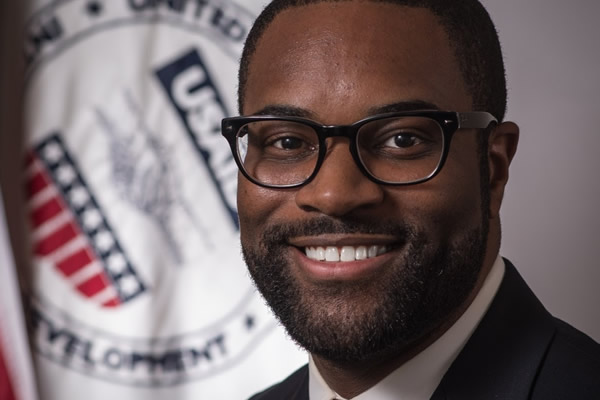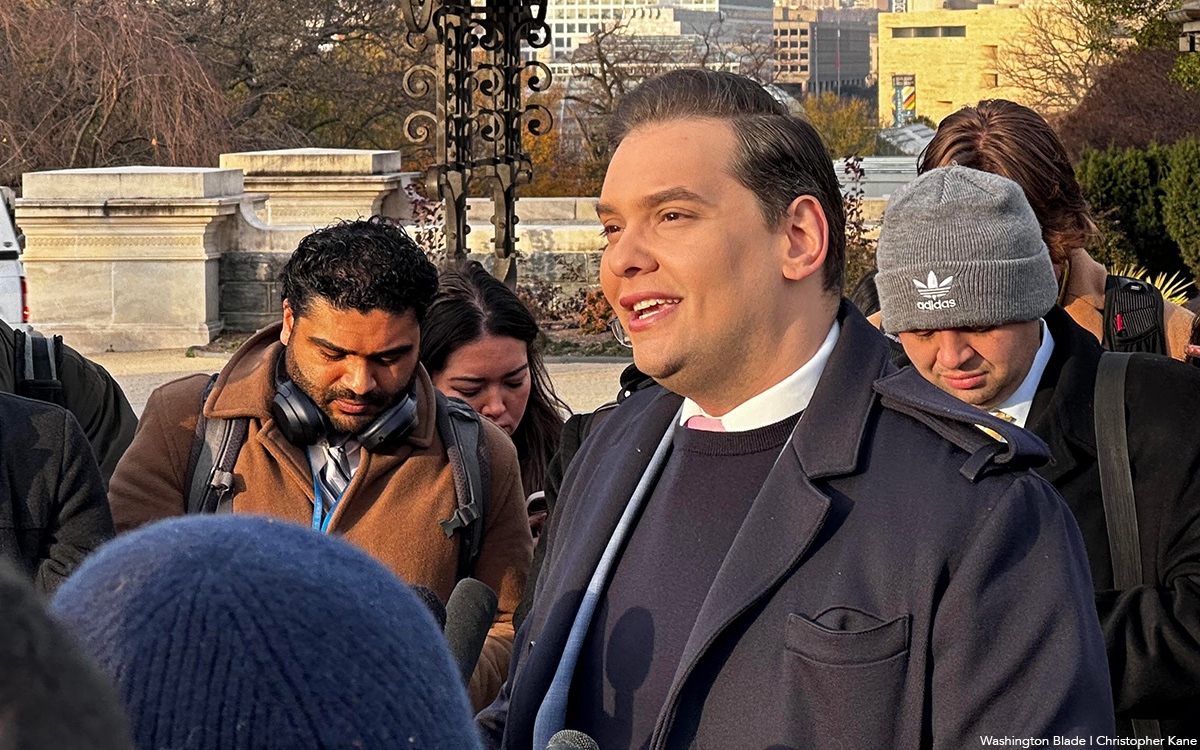Politics
USAID appoints Jay Gilliam to lead global LGBTQ initiatives
Former HRC staffer worked for agency during Obama administration

The U.S. Agency for International Development has appointed Jay Gilliam to lead its efforts to promote LGBTQ rights around the world.
Gilliam was previously the director of the Human Rights Campaign Global program.
The Texas native worked at USAID from 2012-2016. Todd Larson, a retired U.N. official who became USAID’s senior LGBTQ coordinator in 2014, is among those with whom Gilliam worked.
“Both of those experiences taught me about the importance of being able to really talk about this work and amplify it and the ways to do that safely, but also the ways that it’s really important for the U.S. government to be able to lead in this space,” Gilliam told the Washington Blade on Dec. 15 during a telephone interview.
“Being in touch with so many strong advocates and leaders from around the world through that position I think gives me a stronger sense of the needs of the community, the connections,” he added, referring to his HRC work. “Hopefully I can bring into the work that USAID is doing and open doors and get support and resources to those advocates and leaders.”
Gilliam’s position, senior LGBTQI+ coordinator, is within USAID’s Bureau for Development, Democracy and Innovation. He said he has “an open line to” USAID Administrator Samantha Power, who is a vocal champion of LGBTQ rights.
Power on Dec. 6 tweeted a picture of her meeting with Gilliam.
“With decades of global human rights experience, including many years at USAID and HRC, Jay has trained advocates across the globe to advance LGBTQI+ equality,” tweeted Power. “We’re thrilled to have his expertise in this role.”
Great to meet Jay Gilliam, @USAID’s new Senior LGBTQI+ Coordinator. With decades of global human rights experience, including many years at USAID and @HRC, Jay has trained advocates across the globe to advance LGBTQI+ equality. We’re thrilled to have his expertise in this role. pic.twitter.com/cbT7bdGr3B
— Samantha Power (@PowerUSAID) December 6, 2021
Gilliam told the Blade his “overall vision” is to “make it easier for USAID staff and our partners” to advance LGBTQ-specific issues and to “make it easier” for activists around the world “to engage with the agency.”
“For me, this kind of means helping us to recognize advocates better understand USAID’s work,” he said. “This means learning from LGBTQI+ people around the world about their needs and co-creating and resourcing projects that best respond to those needs.”
“This means creating and sharing tools necessary for those of us at USAID and our partners, as well as the broader global development community and global LGBTQI+ community, to better integrate the needs identified for LGBTQI+ persons,” added Gilliam.
Gilliam said he will work to ensure USAID is “giving rightful attention to all parts of our community, the L, the G, the B, the T, the Q and I and all those along the spectrum so that we can really understand and help and support and get people or maybe more attention to those that haven’t gotten it yet.” Gilliam also told the Blade that he is committed to intersectionality.
“I always like to think about it from my own perspective of being black and gay and sitting in many different communities and seeing the way that I am included or not included in that work,” he said. “And I think about that in relation to the needs from the global LGBTQI+ community and the way that they might have multiple identities that include privileges, that include being marginalized by broader society.”
“There’s thinking through and working with colleagues at USAID who are also working with marginalized communities and making sure that we are also paying attention to where our work intersects and being able to shine a spotlight and address the needs coming out of those intersectional communities,” added Gilliam. “For me, it actually also means working in an integrated way across our development space. And so, while there is clearly a need to focus on human rights efforts with LGBTQI+ community and addressing needs of violence, stigma, discrimination, criminalization, there’s also lots of other ways and needs that our community has that USAID is working on.”
Gilliam said expanding economic and educational opportunities are among the other aspects of USAID’s work that directly impact LGBTQ people.
“Focusing on the way that we are integrating LGBTQI+ issues across the agency and the work that it does, it’s also for me and intersectional way to look at this work,” he told the Blade.
The Biden administration in February issued a memorandum that committed the U.S. to promoting LGBTQ rights abroad. Gilliam told the Blade his position “is a reflection of how USAID is able to” implement the directive.
“It gives me the opportunity to engage with people around the agency to say that this is an administration priority that is really important for folks to be able to work on,” said Gilliam.
Politics
George Santos sentenced to 87 months in prison for fraud case
Judge: ‘You got elected with your words, most of which were lies.’

Disgraced former Republican congressman George Santos was sentenced to 87 months in prison on Friday, after pleading guilty last year to federal charges of wire fraud and aggravated identity theft.
“Mr. Santos, words have consequences,” said Judge Joanna Seybert of the U.S. District Court for the Eastern District of New York. “You got elected with your words, most of which were lies.”
The first openly gay GOP member of Congress, Santos became a laughing stock after revelations came to light about his extensive history of fabricating and exaggerating details about his life and career.
His colleagues voted in December 2023 to expel him from Congress. An investigation by the U.S. House Ethics Committee found that Santos had used pilfered campaign funds for cosmetic procedures, designer fashion, and OnlyFans.
Federal prosecutors, however, found evidence that “Mr. Santos stole from donors, used his campaign account for personal purchases, inflated his fund-raising numbers, lied about his wealth on congressional documents and committed unemployment fraud,” per the New York Times.
The former congressman told the paper this week that he would not ask for a pardon. Despite Santos’s loyalty to President Donald Trump, the president has made no indication that he would intervene in his legal troubles.
Congress
Democratic lawmakers travel to El Salvador, demand information about gay Venezuelan asylum seeker
Congressman Robert Garcia led delegation

California Congressman Robert Garcia on Tuesday said the U.S. Embassy in El Salvador has agreed to ask the Salvadoran government about the well-being of a gay asylum seeker from Venezuela who remains incarcerated in the Central American country.
The Trump-Vance administration last month “forcibly removed” Andry Hernández Romero, a stylist who asked for asylum because of persecution he suffered because of his sexual orientation and political beliefs, and other Venezuelans from the U.S. and sent them to El Salvador.
The White House on Feb. 20 designated Tren de Aragua, a Venezuelan gang, as an “international terrorist organization.” President Donald Trump on March 15 invoked the Alien Enemies Act of 1798, which the Associated Press notes allows the U.S. to deport “noncitizens without any legal recourse.”
Garcia told the Washington Blade that he and three other lawmakers — U.S. Reps. Maxwell Alejandro Frost (D-Fla.), Maxine Dexter (D-Ore.), and Yassamin Ansari (D-Ariz.) — met with U.S. Ambassador to El Salvador William Duncan and embassy staffers in San Salvador, the Salvadoran capital.
“His lawyers haven’t heard from him since he was abducted during his asylum process,” said Garcia.
The gay California Democrat noted the embassy agreed to ask the Salvadoran government to “see how he (Hernández) is doing and to make sure he’s alive.”
“That’s important,” said Garcia. “They’ve agreed to that … we’re hopeful that we get some word, and that will be very comforting to his family and of course to his legal team.”

Garcia, Frost, Dexter, and Ansari traveled to El Salvador days after House Oversight and Government Reform Committee Chair James Comer (R-Ky.) and House Homeland Security Committee Chair Mark Green (R-Tenn.) denied their request to use committee funds for their trip.
“We went anyways,” said Garcia. “We’re not going to be intimidated by that.”
Salvadoran President Nayib Bukele on April 14 met with Trump at the White House. U.S. Sen. Chris Van Hollen (D-Md.) three days later sat down with Kilmar Abrego Garcia, a Maryland man who the Trump-Vance administration wrongfully deported to El Salvador on March 15.
Abrego was sent to the country’s Terrorism Confinement Center, a maximum-security prison known by the Spanish acronym CECOT. The Trump-Vance administration continues to defy a U.S. Supreme Court ruling that ordered it to “facilitate” Abrego’s return to the U.S.
Garcia, Frost, Dexter, and Ansari in a letter they sent a letter to Duncan and Secretary of State Marco Rubio on Monday demanded “access to” Hernández, who they note “may be imprisoned at” CECOT. A State Department spokesperson referred the Blade to the Salvadoran government in response to questions about “detainees” in the country.
Garcia said the majority of those in CECOT who the White House deported to El Salvador do not have criminal records.
“They can say what they want, but if they’re not presenting evidence, if a judge isn’t sending people, and these people have their due process, I just don’t understand how we have a country without due process,” he told the Blade. “It’s just the bedrock of our democracy.”

Garcia said he and Frost, Dexter, and Ansari spoke with embassy staff, Salvadoran journalists and human rights activists and “anyone else who would listen” about Hernández. The California Democrat noted he and his colleagues also highlighted Abrego’s case.
“He (Hernández) was accepted for his asylum claim,” said Garcia. “He (Hernández) signed up for the asylum process on an app that we created for this very purpose, and then you get snatched up and taken to a foreign prison. It is unacceptable and inhumane and cruel and so it’s important that we elevate his story and his case.”
The Blade asked Garcia why the Trump-Vance administration is deporting people to El Salvador without due process.
“I honestly believe that he (Trump) is a master of dehumanizing people, and he wants to continue his horrendous campaign to dehumanize migrants and scare the American public and lie to the American public,” said Garcia.
The State Department spokesperson in response to the Blade’s request for comment referenced spokesperson Tammy Bruce’s comments about Van Hollen’s trip to El Salvador.
“These Congressional representatives would be better off focused on their own districts,” said the spokesperson. “Instead, they are concerned about non-U.S. citizens.”
Congress
Goodlander endorses Pappas’s Senate bid
Announcement puts gay congressman on the path to securing his party’s nomination

U.S. Rep. Maggie Goodlander (D-N.H.) on Thursday announced she will not run to represent her state in the U.S. Senate, endorsing gay U.S. Rep. Chris Pappas’s (D-N.H.) bid for the seat of retiring U.S. Sen. Jeanne Shaheen, putting him on the path to secure the Democratic nomination.
“We are in the fight of our lifetimes right now, of a moment of real crisis and challenge,” she said. “I feel humbled and grateful to so many people across our state who have encouraged me to take a look at the U.S. Senate, and after a lot of thought and conversations with people I love and people I respect and people who I had never met before, who I work for in this role right now, I’ve decided that I’m running for re election in the House of Representatives.”
When asked by a reporter from the ABC affiliate station in New Hampshire whether she would endorse Pappas, Goodlander said, “Yes. Chris Pappas has been amazing partner to me in this work and for many years. And I really admire him. I have a lot of confidence in him.”
She continued, “He and I come to this work, I think with a similar set of values, we also have really similar family stories. Our families both came to New Hampshire over 100 years ago from the very same part of northern Greece. And the values that he brings to this work are ones that that I really, really admire. So I’m proud to support him, and I’m really excited to be working with him right now because we’ve got a lot of work to do.”
Today in Salem @MaggieG603 tells @WMUR9 she is not running for U.S. Senate & endorses @ChrisPappasNH #NHPolitics #NHSen #NH02 #WMUR pic.twitter.com/W2CMrhRuIC
— Adam Sexton (@AdamSextonWMUR) April 17, 2025
“Maggie Goodlander has dedicated her career to service, and we can always count on her to stand up to powerful interests and put people first,” Pappas said in a post on X. “I’m so grateful to call her my friend and teammate, and I’m proud to support her re-election and stand with her in the fights ahead.”
Earlier this month, former New Hampshire Gov. Chris Sununu, a Republican, announced he would not enter the Senate race, strengthening the odds that Democrats will retain control of Shaheen’s seat.
-

 Federal Government3 days ago
Federal Government3 days agoHHS to retire 988 crisis lifeline for LGBTQ youth
-

 Opinions3 days ago
Opinions3 days agoDavid Hogg’s arrogant, self-indulgent stunt
-

 District of Columbia3 days ago
District of Columbia3 days agoD.C. police seek help in identifying suspect in anti-gay threats case
-

 Virginia3 days ago
Virginia3 days agoGay talk show host wins GOP nom for Va. lieutenant guv










